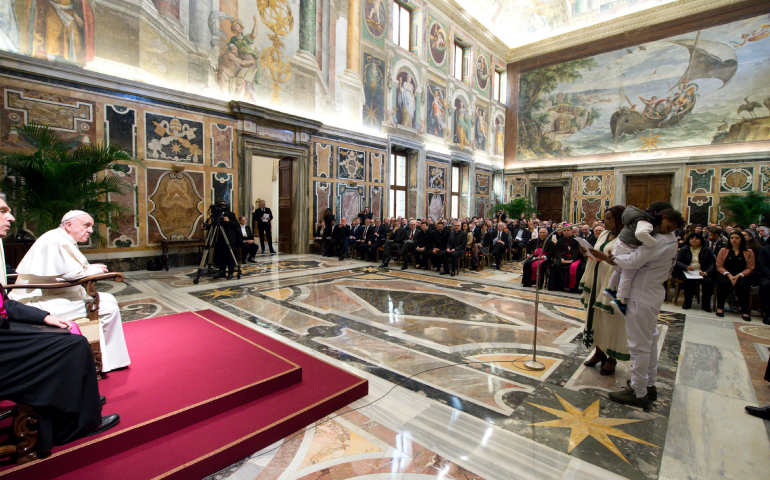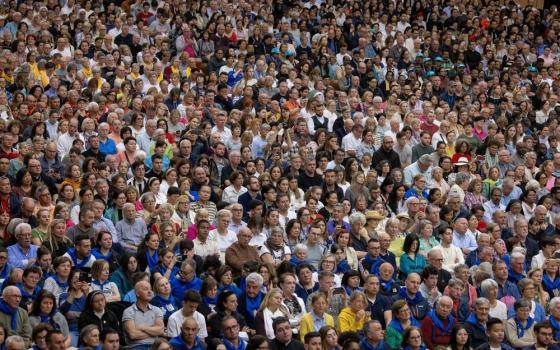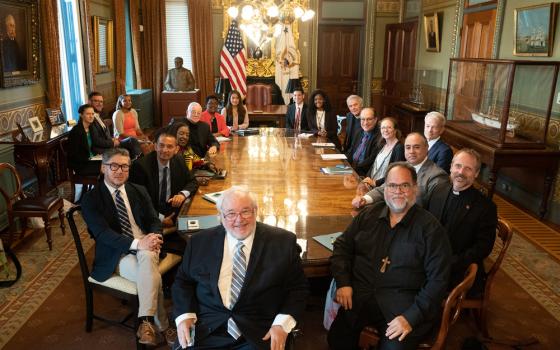
Refugees from Eritrea tell Pope Francis about their journey to safety during a meeting Feb. 21 at the Vatican with participants in the VI International Forum on Migration and Peace. (CNS photo/L’Osservatore Romano)
Indifference, fueled by populist rhetoric in today's world, fans the flames of rejection that threaten the rights and dignity of migrants, Pope Francis said.
Refugees escaping persecution, violence and poverty are often shunned and deemed as "unworthy of our attention, a rival or someone to be bent to our will," the pope told participants of the VI International Forum on Migration and Peace.
"Faced with this kind of rejection, rooted ultimately in self-centeredness and amplified by populist demagoguery, what is needed is a change of attitude to overcome indifference and to counter fears with a generous approach of welcoming those who knock at our doors," he said Feb. 21.
The Feb. 21-22 conference, "Integration and Development: From Reaction to Action," was organized by the Scalabrini International Migration Network and sponsored by the Vatican's Dicastery for Promoting Integral Human Development.
According to the forum's website, the conference focused on refugee crisis management while aiming to "influence migration policies and practices in Europe."
In his speech, the pope said millions of people are being forced to flee their homelands due to "conflict, natural disasters, persecution, climate change, violence, extreme poverty and inhumane living conditions."
To confront this challenge, he said, the church and civil society must have a "shared response" of welcoming, protecting, promoting and integrating migrants and refugees.
Providing access to "secure humanitarian channels" — legal paths to safety — is crucial in helping people who are "fleeing conflicts and terrible persecutions," but are often met with rejection and indifference.
"A responsible and dignified welcome of our brothers and sisters begins by offering them decent and appropriate shelter," the pope said.
Citing Pope Benedict XVI, the pope said the need to defend the "inalienable rights" of exiled and exploited men and women is a duty "from which no one can be exempted."
"Protecting these brothers and sisters is a moral imperative which translates into adopting juridical instruments, both international and national, that must be clear and relevant," the pope said.
Protection, he added, can only be guaranteed by ensuring "necessary conditions," such as fair access to fundamental goods that offer "the possibility of choice and growth."
Pope Francis also highlighted the need for integration, which is a "two-way process rooted essentially in the joint recognition of the other's cultural richness."
Integration is different from assimilation, he said, warning that superimposing one culture over another has the "insidious and dangerous risk of creating ghettos."
At the same time, he said, migrants are "duty bound not to close themselves off from the culture and traditions of the receiving country" while "respecting above all its laws."
Helping migrants, exiles and refugees "is today a responsibility, a duty we have toward our brothers and sisters who, for various reasons, have been forced to leave their homeland: a duty of justice, civility and solidarity," the pope said.
Responding to the migration crisis also involves addressing the root causes of the situations that force people to flee, he said, pointing particularly to "unacceptable economic inequality," which violates "the principle of the universal destination of the earth's goods."
"One group of individuals cannot control half of the world's resources," Pope Francis said. "We cannot allow for persons and entire peoples to have a right only to gather the remaining crumbs."
Recognizing each person as a member of the same human family, brother or sister created in God's image, is key to ensuring a proper response to the crisis, the pope insisted. "Fraternity is the most civil way of relating to the reality of another person, which does not threaten us but engages, reaffirms and enriches our individual identity."
Pope Francis called for "a change of attitude" in understanding the needs of migrants and refugees, a change that moves away from fear and indifference to a "culture of encounter" that builds "a better, more just and fraternal world."
"The duty of solidarity is to the counter the throwaway culture and give greater attention to those who are weakest, poorest and most vulnerable," he said.





